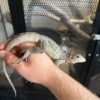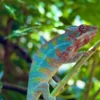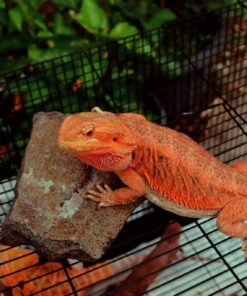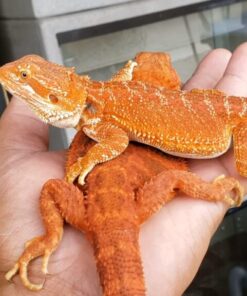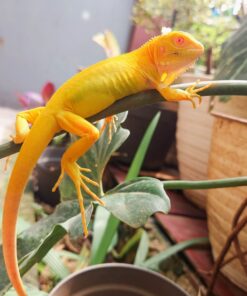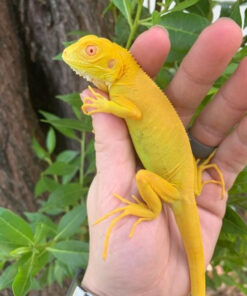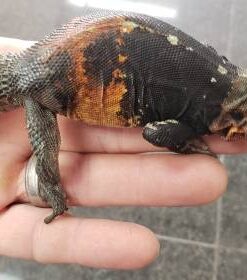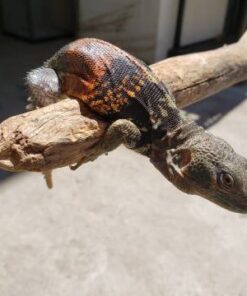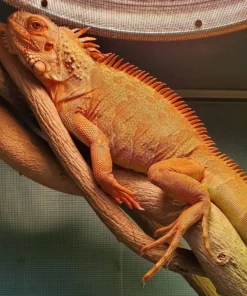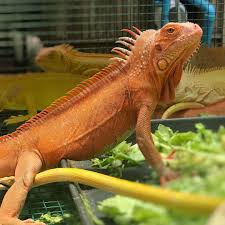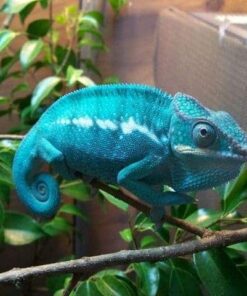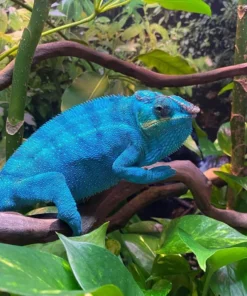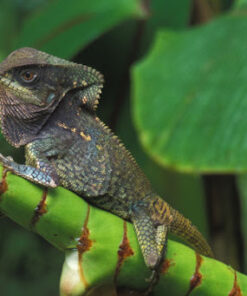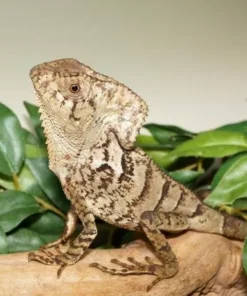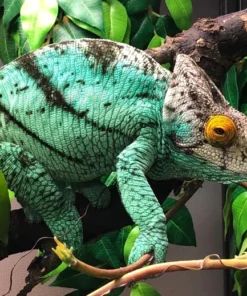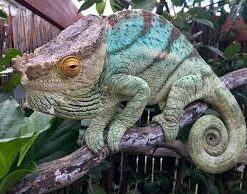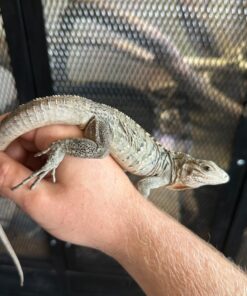$999.99
Explore our collection of captive-bred Baby Lesser Antillean Iguanas. Find out how these herbivores develop beautiful markings and what they eat. Get your own exotic pet today!
Categories: Iguanas for Sale, Lizards for Sale
Baby Lesser Antillean Iguana for Sale: A Comprehensive Guide
If you’re considering adding a unique reptile to your collection or household, look no further than the **Lesser Antillean Iguana**. Known for its distinctive beauty, charm, and importance to biodiversity, the Lesser Antillean Iguana is a species worth learning about, especially if you’re in the market for one. This guide will provide you with everything you need to know about the **Baby Lesser Antillean Iguana for Sale**, their care, and what to expect when owning such a unique reptile.
Introduction to the Lesser Antillean Iguana
The Lesser Antillean Iguana (Iguana delicatissima) is a rare species of iguana native to the Lesser Antilles, a group of islands in the Caribbean. This iguana is most commonly found on islands such as Saint Lucia, Dominica, and Antigua. It differs from its close relative, the green iguana, in a variety of ways, including its distinct facial features, scale patterns, and coloration.
As a baby, the Lesser Antillean Iguana is particularly striking, with vibrant greens, light browns, and blues that become more defined as the iguana matures. Its rarity and striking appearance make it a highly sought-after reptile in the pet trade, which is why people often search for **Baby Lesser Antillean Iguana for Sale**.
Why Choose a Baby Lesser Antillean Iguana?
1. **Unique Appearance**: The Lesser Antillean Iguana stands out because of its distinct physical traits. Its body is typically a vibrant shade of green or gray, and its scales offer a textured look that appeals to reptile enthusiasts. As these iguanas grow older, their appearance becomes even more refined, with adults boasting vivid and striking colors that vary depending on their habitat and diet.
2. **Endangered Species**: The Lesser Antillean Iguana is an endangered species, making its preservation and care important. By choosing to purchase a **Baby Lesser Antillean Iguana for Sale** from a reputable breeder, you’re contributing to the conservation of this species. Many breeders and reptile enthusiasts take pride in caring for these iguanas and helping ensure their survival.
3. **Docile Nature**: While the Lesser Antillean Iguana is often more shy and reclusive compared to the green iguana, it has a docile and curious temperament. With proper handling and care, it can grow to become a tame, gentle pet that enjoys interacting with its owner.
4. **Longevity**: Lesser Antillean Iguanas can live up to 20 years or more in captivity, especially when provided with the right care and environment. Their long lifespan allows for an enduring relationship between you and your iguana, making them a long-term pet companion.
What to Know Before Buying a Baby Lesser Antillean Iguana
When you’re searching for **Baby Lesser Antillean Iguana for Sale**, it’s important to be fully prepared for the responsibilities that come with owning this rare species. Here’s a breakdown of what you should consider:
1. **Legality and Conservation Concerns**: Before purchasing a Lesser Antillean Iguana, it’s essential to be aware of the regulations regarding owning exotic reptiles in your area. Since the species is endangered, it is often subject to strict protections and laws. Always ensure that you are purchasing from a certified breeder who adheres to legal and ethical practices, and check if any special permits are required in your locality.
2. **Commitment to Care**: The care of a **Baby Lesser Antillean Iguana** involves providing them with the proper diet, habitat, and environmental conditions. Like all reptiles, they require careful attention to temperature, humidity, and nutrition. Owning an iguana is a long-term commitment, as these reptiles can live for two decades or more with proper care.
3. **Researching Breeders**: Finding a reputable breeder is essential to ensure the health and well-being of your iguana. When looking for a **lesser antillean iguana for sale**, inquire about the breeding practices, the iguana’s health history, and if the breeder provides necessary care instructions. Ethical breeders will also often contribute to conservation efforts, ensuring that they are not harming wild populations.
4. **Space Requirements**: Lesser Antillean Iguanas need plenty of space to thrive, even as babies. These reptiles are active climbers and explorers, so you’ll need to invest in a large, secure enclosure that includes branches, rocks, and other objects to stimulate their natural behaviors. Providing a spacious habitat helps prevent stress and ensures they stay healthy.
Setting Up a Habitat for Your Baby Lesser Antillean Iguana
Creating the ideal habitat for your **Baby Lesser Antillean Iguana** is one of the most important aspects of ownership. Here’s what you’ll need to consider:
1. **Enclosure Size**: Baby iguanas might be small, but they grow quickly and will need a large space. A minimum enclosure size of 4 feet long, 3 feet wide, and 6 feet high is recommended for an adult Lesser Antillean Iguana. A smaller enclosure may suffice for a baby, but it’s a good idea to plan ahead for when your iguana reaches full size, which can be up to 4-6 feet in length.
2. **Heating and Lighting**: Proper heating and UVB lighting are critical to your iguana’s health. Reptiles depend on external heat sources to regulate their body temperature, so you’ll need to set up a basking spot that stays between 90°F and 100°F. The ambient temperature in the enclosure should be between 75°F and 85°F during the day. UVB lighting is crucial for calcium absorption, preventing metabolic bone disease, and promoting healthy growth.
3. **Humidity**: The Lesser Antillean Iguana comes from tropical environments, so maintaining a humidity level of 60-80% in their enclosure is necessary. Mist the habitat regularly and provide a large water bowl to help keep the environment humid. You can also include live plants and moist substrate to aid in humidity control.
4. **Substrate and Furnishings**: Provide a naturalistic environment for your iguana with a substrate such as coconut fiber, soil, or reptile-safe mulch. Avoid substrates like sand or gravel that can cause impaction if ingested. Also, include branches, climbing structures, and hiding spots to mimic their natural habitat and encourage physical activity.
Diet and Nutrition
A **Baby Lesser Antillean Iguana** requires a varied and balanced diet to ensure it grows into a healthy adult. In the wild, Lesser Antillean Iguanas are herbivores, primarily feeding on leaves, flowers, and fruits. In captivity, you should aim to replicate this diet as closely as possible. Here’s what to feed your iguana:
1. **Leafy Greens**: Dark, leafy greens should make up the bulk of your iguana’s diet. Offer a variety of options like collard greens, mustard greens, dandelion greens, and turnip greens. These vegetables provide essential nutrients like calcium, which is vital for your iguana’s development.
2. **Vegetables and Fruits**: Supplement your iguana’s diet with vegetables such as squash, bell peppers, and carrots, along with occasional fruits like papaya, mango, and strawberries. However, fruits should only be offered in moderation, as too much sugar can lead to health issues.
3. **Calcium and Vitamin Supplements**: To prevent calcium deficiency, dust your iguana’s food with a calcium supplement a few times a week. A vitamin D3 supplement may also be needed, especially if your iguana is not exposed to natural sunlight.
4. **Fresh Water**: Always provide fresh, clean water in a shallow bowl that your iguana can access easily. This is important for hydration and overall health.
Health and Wellness
Maintaining the health of your **Baby Lesser Antillean Iguana** requires vigilance and regular veterinary care. Here are some key health considerations:
1. **Common Health Issues**: Like other reptiles, iguanas can be prone to certain health problems, such as metabolic bone disease (MBD), respiratory infections, and parasites. MBD is a common issue caused by calcium deficiency, often due to inadequate UVB lighting or improper diet. Signs of MBD include lethargy, bone deformities, and difficulty moving.
2. **Regular Veterinary Check-Ups**: It’s important to find a veterinarian who specializes in reptiles to perform regular health checks. This helps identify potential issues early and ensure your iguana is growing and developing properly.
3. **Signs of Illness**: Keep an eye on your iguana for any signs of illness, such as lack of appetite, abnormal droppings, or changes in behavior. If you notice anything unusual, consult a veterinarian immediately.
Socialization and Handling
While the Lesser Antillean Iguana is generally more reserved and shy than other iguana species, proper handling from a young age can help them become more accustomed to human interaction. Here’s how to socialize your **Baby Lesser Antillean Iguana**:
1. **Start Slowly**: When you first bring your baby iguana home, give it time to adjust to its new surroundings. Avoid handling it too much in the beginning to prevent stress.
2. **Gentle Handling**: Once your iguana is more comfortable in its environment, start handling it for short periods each day. Always be gentle and support its body to make it feel secure.
3. **Building Trust**: Over time, your iguana will become more accustomed to being handled, and you can gradually increase the duration of your interactions. Be patient, as each iguana has its own personality and will adjust at its own
pace.
Conclusion
Owning a **Baby Lesser Antillean Iguana** is a rewarding and exciting experience, but it requires dedication, knowledge, and a commitment to providing the best possible care. From setting up a suitable habitat to ensuring a balanced diet and regular veterinary care, the journey of raising a Lesser Antillean Iguana is full of responsibility but also incredible joy. If you’re searching for a **lesser antillean iguana for sale**, make sure to choose a reputable breeder who prioritizes the health and conservation of this endangered species.
At **New York Reptiles**, we’re passionate about reptiles and committed to helping you find the perfect pet. Whether you’re a first-time reptile owner or an experienced enthusiast, we’re here to provide guidance and support every step of the way. Explore our listings for **Baby Lesser Antillean Iguana for Sale** and embark on an exciting new adventure with one of these fascinating creatures.
Related products
Sale!
Iguanas for Sale
$500.00 – $849.00
Chameleons for Sale
$199.99
Chameleons for Sale
Parson Chameleon for Sale – Captive Bred Males | 14-15 Inches
$699.99

